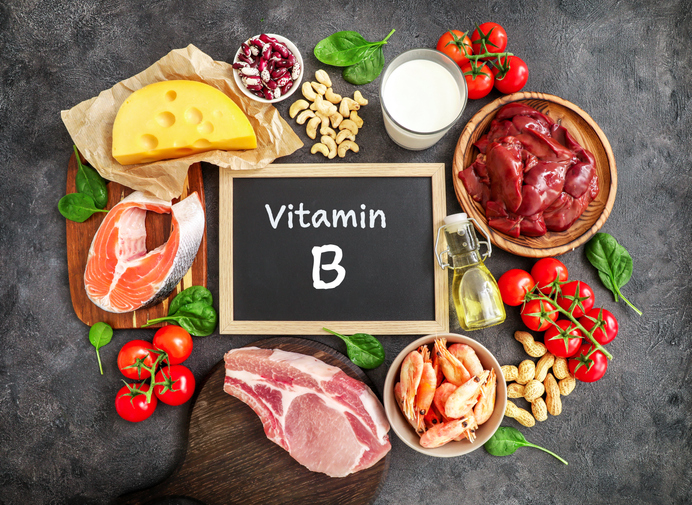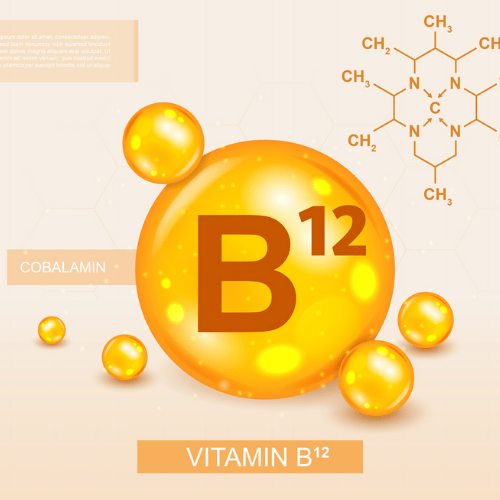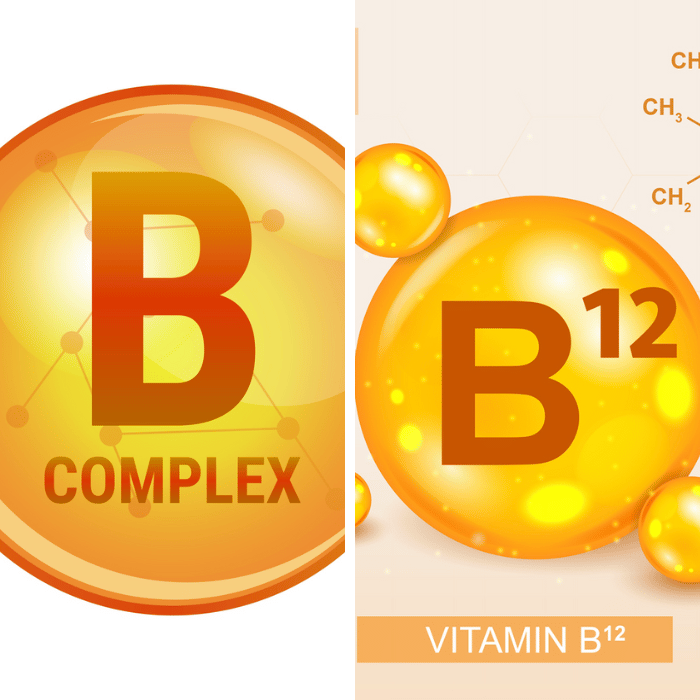Are you feeling sluggish or fatigued? Perhaps you’re wondering if your diet provides all the essential nutrients your body needs to function optimally. B vitamins are vital for maintaining good health, energy production, and a well-functioning nervous system. In this blog post, you’ll learn the differences and similarities between B Complex and B12, “Is it better to take B Complex or B12?” and how to choose the best supplement for your needs.
Key Takeaways
- B vitamins are essential for overall health and well-being, providing energy, forming new blood cells, and supporting healthy skin.
- B Complex is an all-in-one solution that provides numerous benefits, while Vitamin B12 is essential for vegans/vegetarians to maintain proper functioning of the body.
- When selecting a supplement, it’s important to consider dietary restrictions & consult a healthcare professional. Look for third-party testing & certification and natural ingredients from reputable brands.
Understanding B Vitamins: The Essentials

B vitamins, or complex vitamins, are a group of water-soluble vitamins essential for maintaining overall health and well-being. They support energy production, nervous system function, and cell metabolism, ensuring your body functions properly. These essential vitamins, with eight B vitamins, each play a unique and crucial role in maintaining good health.
A balanced diet usually provides enough B vitamins, but in some cases, supplementation might be necessary. B complex vitamins are popular for those looking to support their overall health and ensure they get all the B vitamins they need. Nevertheless, specific individuals may need targeted supplementation, like vitamin B12, which is especially significant for vegans and vegetarians.
The Role of B Vitamins in the Body
B vitamins are fundamental to sustaining overall health, averting deficiencies, and backing up multiple bodily functions. They help convert food into energy, promote the formation of new blood cells, and maintain healthy skin, brain, and other body tissues. Also, B vitamins directly influence energy levels, brain function, and cellular metabolism.
Older adults, pregnant women, and those on a strictly plant-based diet may benefit from B vitamin supplements. Such supplements can offer them additional nutritional support. Typically, a balanced diet should supply the required intake of B vitamins from food sources such as:
- whole grains
- leafy green vegetables
- nuts
- animal products
However, a complex supplement could be an option if your diet fails to provide sufficient B vitamins.
The Importance of Each B Vitamin
Each B vitamin has unique benefits and functions, making it important to maintain adequate levels of all B vitamins. For example, pantothenic acid, one of the B vitamins, is essential for hormone and cholesterol production. Pregnant or planning to conceive individuals may require more folate to reduce the risk of birth defects.
Dietary sources of various B vitamins include:
- organ meats
- beef
- oatmeal
- mushrooms
- pork
- sunflower seeds
- wheat germ
- leafy greens
- liver
- beans
These vitamins can also be obtained from fortified foods or supplements in the form of folic acid. A study in adults with depression showed that taking a vitamin B complex over 60 days resulted in a marked improvement in their depression and anxiety symptoms. The positive results of this study highlighted the potential for vitamin B as a safe and effective treatment for these conditions.
Moreover, research indicates that a high-dose B-complex and mineral supplement can positively impact mental health and stress levels and improve cognitive test performance.
B Complex: All-in-One Solution for B Vitamins

B Complex offers a handy, all-encompassing solution for those aiming to bolster overall health and well-being. This dietary supplement encompasses all eight B vitamins, offering multiple benefits like energy production, nervous system support, and red blood cell generation. B Complex is especially beneficial for individuals with specific dietary restrictions, pregnant women, older adults, or those experiencing symptoms of B vitamin deficiency.
B Complex supplements can help reduce fatigue, improve mood, and enhance cognitive function. It is generally safe for most individuals to consume daily, as B vitamins are water-soluble and difficult to take in excessive amounts. However, it is always a good idea to consult a healthcare professional before starting any new supplement regimen.
Components and Benefits of B Complex
B Complex contains all eight B vitamins, each with unique benefits and functions. They support energy production, brain health, immune system function, and red blood cell production. Taking a B complex supplement enables you to reap benefits, including enhanced energy levels, healthy skin, hair, and nails, a robust immune system, and correct brain function.
Supplementing with B Complex may also help with metabolism, heart, and bone health, making it an essential nutrient for overall well-being. Ensuring you receive all the B vitamins your body requires supports your overall health and optimizes your body’s performance.
Who Should Consider Taking B Complex?
B Complex might be especially useful for individuals with distinct dietary restrictions, pregnant women, older adults, or those exhibiting symptoms of B vitamin deficiency. Symptoms of deficiency can include:
- tiredness or fatigue
- weakness
- constipation
- loss of appetite
- weight loss
- numbness and tingling in the hands and feet
- muscle weakness
- pale or yellowish skin
- irregular heartbeats
- vision problems
Pregnant women may find B vitamins especially beneficial, as they are essential for the proper development of the unborn baby, reducing the risk of birth defects, and managing pregnancy-related symptoms. Older adults may also benefit from B complex supplementation, as the body’s ability to absorb and utilize B vitamins, particularly vitamin B12, decreases with age.
Individuals with dietary restrictions, such as vegan or vegetarian diets, may have difficulty obtaining adequate B vitamins from food sources and may benefit from B complex supplementation.
Vitamin B12: The Essential Vitamin for Vegans and Vegetarians

Vitamin B12 is notably significant for vegans and vegetarians, as it is mainly present in animal products and plays a key role in nervous system function and red blood cell production. Vitamin B12 deficiency can lead to various health issues, including fatigue, weakness, and neurological problems. Therefore, vegans and vegetarians must ensure they get enough vitamin B12 through fortified foods or supplementation.
Vitamin B12 supports:
- Energy production
- Metabolism
- Heart health
- Bone health
Making it an essential nutrient for overall well-being. Maintaining sufficient vitamin B12 levels can bolster your overall health and aid your body in performing optimally.
Benefits of Vitamin B12
Vitamin B12 plays a critical role in the production of DNA, brain cells, nerve cells, and red blood cells, which are integral for energy production. Studies have shown that reducing homocysteine levels in the blood can lower the risk of dementia, heart attack, and stroke. This can be achieved through certain dietary changes, including consuming amino acids. Additionally, vitamin B12 is a key component in the body’s metabolism.
Supplementing with vitamin B12 can help reduce fatigue, improve mood, and enhance cognitive function. Vitamin B12 plays an essential role in the optimal functioning of our nervous system. It is also vital for the formation of red blood cells. Ensuring you receive all the B vitamins your body requires supports your overall health and optimizes your body’s performance.
Risks of Vitamin B12 Deficiency
Vitamin B12 deficiency can lead to various health issues, including:
- fatigue
- weakness
- Neurological problems
Vegans and vegetarians must ensure they get enough vitamin B12 through fortified foods or supplementation. A deficiency in vitamin B12 can cause anemia, fatigue, and nerve problems, and if severe, can lead to depression and memory loss.
Individuals with specific dietary restrictions, elderly adults, and those displaying signs of B vitamin deficiency are most likely vulnerable to vitamin B12 deficiency. It is crucial to consult with a healthcare professional to determine the precise B vitamin needs based on individual health considerations.
Comparing B Complex and B12: Key Differences and Similarities
B Complex and B12 have unique benefits and functions but are essential for overall health and well-being. The main distinctions between B Complex and B12 are the quantity of vitamins included and the health benefits of each supplement. B Complex encompasses all eight B vitamins, while B12 is a distinct vitamin within the B complex.
B Complex and B12, being water-soluble, are key in maintaining general health and well-being. These vitamins collaborate to ensure:
- Proper nerve functioning
- Conversion of nutrients into energy
- A healthy immune system
- Cellular functioning
Taking B Complex or Vitamin B12 supplements can be beneficial in providing these advantages and supporting overall wellness.
Key Differences
The main differences between B Complex and B12 are the number of vitamins included and the specific health benefits of each supplement. B Complex contains all eight B vitamins, offering a range of benefits such as mood enhancement, brain function protection, skin healing promotion, and food conversion into energy.
In contrast, vitamin B12 is a single vitamin that plays a critical role in DNA synthesis and forming red blood cells, which are integral for energy production.
Key Similarities
The key similarities between B Complex and B12 include:
- Their water-soluble nature
- Their importance in supporting overall health and well-being
- Both contribute to the body’s ability to convert food into energy and facilitate the utilization of fats and proteins.
Ensuring sufficient levels of both B Complex and B12 can bolster your overall health, aid your body in performing optimally, and contribute to maintaining healthy skin.
Factors to Consider When Choosing Between B Complex and B12

Your choice between B Complex and B12 hinges on individual needs, dietary limitations, and health objectives. Before settling on the most appropriate supplement, you must evaluate your requirements, like specific deficiencies, nutritional restrictions, and health concerns.
A consultation with a healthcare professional can assist in determining the most suitable supplement and dosage for individual needs and objectives. They can offer guidance tailored to your nutrient requirements, age, and health status.
Assessing Your Individual Needs
Assessing individual needs involves considering specific deficiencies, dietary restrictions, and health concerns. Particular deficiencies can directly affect the necessity for B vitamins, including folate and riboflavin deficiencies, which can increase the requirement for B vitamins and harm brain function and anemia.
Dietary restrictions, such as vegan or vegetarian diets, can also influence the decision between B Complex and B12.
Consulting a Healthcare Professional
Consulting a healthcare professional can help determine the most suitable supplement and dosage for your needs and objectives. A healthcare professional can advise you on whether B Complex or B12 is the most appropriate supplement for you by discussing your specific deficiencies, dietary restrictions, and health concerns.
It is essential to consult with a healthcare professional before starting any new supplement regimen.
Tips for Selecting a Quality Supplement
Choosing a quality supplement requires consideration of the following aspects:
- Third-party testing: This can verify that the supplement is secure and of superior quality.
- Natural ingredients: These provide multiple health benefits.
- Trustworthy brands: Reputable brands comply with regulations, have refined branding, and use trust signals to capture consumer attention.
Choosing a supplement that includes third-party testing and certification, natural ingredients, and a trustworthy brand guarantees the product’s quality and effectiveness. It is also essential to look for brands labeled with certifications, such as NSF International, US Pharmacopeia, Underwriters Laboratory, or Consumer Lab seals to guarantee product quality.
Third-Party Testing and Certification
Third-party testing and certification ensure the supplement’s quality, safety, and effectiveness. Independent organizations, such as:
- NSF International
- US Pharmacopeia
- Underwriters Laboratory
- Consumer Lab
Carry out testing and evaluation to confirm that the supplements meet specified standards and quality prerequisites, thus instilling confidence in consumers about the safety and effectiveness of the products bought.
Natural Ingredients and Reputable Brands
Opting for supplements with natural ingredients and from reliable brands can help guarantee the product’s quality and effectiveness. Natural ingredients in vitamin supplements offer numerous benefits, as they are derived from whole foods and are more easily recognized and utilized by the body. Reputable brands source ingredients from trusted suppliers who adhere to rigorous quality assurance standards and test the final products for purity and potency.
As we've explored the critical factors in selecting a quality supplement, it's clear that third-party testing, natural ingredients, and trustworthy brands play pivotal roles in ensuring you get the best product for your health. But how do these factors apply specifically to vitamin B complex supplements? For a deeper dive into this topic, I invite you to read my article, ‘Everything You Should Look for In a Vitamin B Complex Liquid Supplement.’ In this piece, I review the top 5 vitamin B complex liquid supplements, providing insights and guidance to help you make an informed choice tailored to your health needs. Join me there as we continue our journey toward optimal health and well-being!👇
Wrapping Up: The B Complex vs B12 Showdown
As we draw the curtain on our discussion about this dynamic duo of the vitamin world, let's take a moment to appreciate the powerhouse roles that B vitamins play in our search for optimal health. Vitamin B Complex, a versatile group of nutrients, and B12, the individual player, bring unique benefits to the table. They're good for you and essential for various bodily functions that keep you energized and healthy.
Before choosing between vitamin B Complex and vitamin B12, remember that your health narrative is the leading character in this story. Dietary needs, personal health objectives, and even the unique quirks of your body's chemistry are your guides. To navigate this landscape, don't go it alone—seek a healthcare professional for advice tailored just for you.
And for those of you whose curiosity is as insatiable as your desire for wellness, I've got more for you. I also did a deep dive on Vitamin B1: ‘Thiamine and Benfotiamine: More Than Just Vitamin B1.’ It's not just another article; it's your ticket to a broader understanding of the B vitamin family, a journey that promises to enrich your knowledge and health.
So, whether you're deciding on a supplement or simply hungry for knowledge, remember: the right choice is the one that fits you like a glove. Here's to your health and the incredible world of B vitamins.
Frequently Asked Questions
Is it best to take a vitamin B12 or a vitamin B complex?
It is best to take a vitamin B complex as it contains B12 and other B Vitamins that work synergistically together to support energy, metabolism, and DNA/RNA synthesis.
Is it OK to take B complex every day?
Taking a B-complex supplement as directed is generally safe and can even be beneficial for some people. However, high doses of B vitamins should only be taken under a health professional's guidance, and avoid taking excessively high quantities as this could lead to serious side effects.
What are the main differences between B Complex and B12?
B Complex contains all eight B vitamins, while B12 is a single vitamin within the B complex. As such, B Complex offers a range of health benefits compared to B12, which is limited to its individual vitamin effects.
How can I ensure I am getting enough B vitamins?
To ensure adequate intake of B vitamins, aim to consume a balanced diet that includes whole grains, fruits, vegetables, and lean proteins. If needed, consider taking a supplement for extra support.
How do I know if I have a vitamin B deficiency?
If you experience any of the mentioned symptoms, such as fatigue, weakness, numbness, and tingling in the hands and feet, it could indicate a vitamin B deficiency. See a healthcare professional for diagnosis.
Thanks for taking this journey to explore which is better, B Complex or B12. If you want to know more about the top B Complex Liquid supplements in the market, check out our article referenced above as well - it contains significant information to add to your library of knowledge!
Also, please return soon to check out our next review of another incredible supplement – we’re always looking out for YOU!
*We are not qualified medical advisors. The content here is only based on our personal opinions and should NOT be used as a substitute for a healthcare professional's advice!











Member discussion